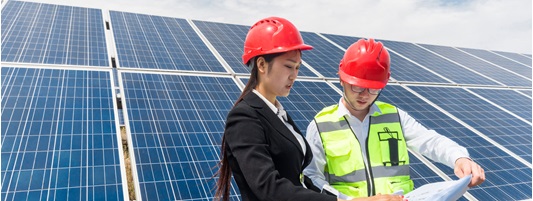Overview
Over the years, IRENA has addressed the gender dimension of renewable energy in multiple publications and programmatic activities to help fill the knowledge gap in this field. Women account for one-third of the global renewables workforce, but their participation varies widely among countries and industries. The pandemic has had a negative impact on gender equity.
Assessments of gender equity in renewable energy
In 2017, IRENA in collaboration with Bloomberg New Energy Finance (BNEF) and the Clean Energy Business Council (CEBC) published a joint brief that included results from a regional survey conducted exclusively in the MENA region.
In 2019, the first global report dedicated to gender in renewable energy was published, titled “Renewable Energy: A Gender Perspective”. The report examines the question of gender equity throughout the sector across different technologies. Building on a ground-breaking survey of employees, companies and institutions (one of the largest surveys conducted on gender in renewable energy to date), it finds that much remains to be done to boost women’s participation and allow their talents to be fully utilised. The study finds that 32% of the renewable energy workforce are women. A later study by IRENA on the wind energy sector found that women’s talents and insights are even more under-utilised in the wind energy sector, where women represent only 21% of the workforce. The latest study, dedicated to the solar PV sector, finds that the share of women working full time in the solar PV industry is 40%, the highest share of any renewable energy subsector analysed by IRENA to date. Yet the 40% share held by women in solar PV still trails the global average of women in the overall economy, estimated at 45.9%.
While the renewable energy sector fares better than the conventional energy sector as women are generally more attracted to the multidisciplinary dimensions of renewable energy than to traditional energy in general. However, still the energy sector is primarily perceived as a male-sector.
The results from these surveys also suggest that the lack of gender equity is particularly pronounced in technical, managerial, and policy-making positions. Substantial efforts are still needed to enable the greater participation of women at all levels.
In areas where there is limited electricity access, or it is still expanding, engaging women as active agents of change in deploying off-grid renewable energy solutions is known to improve sustainability and gender outcomes. Renewable solutions bring energy choices to the household and community level, where women tend to have a greater voice.
In terms of employment, the distributed nature of off-grid renewable energy solutions offers tremendous employment opportunities for women’s engagement along multiple segments of the value chain. Women can participate in consultation and planning, in construction, operation, and through the development of productive uses.
A great share of the skills needed to benefit of those opportunities can be developed locally, and women are ideally placed to lead and support the delivery of off-grid renewable energy solutions. Several initiatives suggest how women’s engagement brings essential improvements in their own self-perception and empowerment within the community.
Women bring new perspectives to the workplace, improve collaboration, and enable better performance overall. Women’s leadership and contributions will be crucial to ensuring that the energy systems of the future address the needs of modern societies, take on the challenges of climate change and the COVID 19 pandemic, and leave no one behind.
Past Events
View more-
13 October 2025 Virtual
Renewable Energy: A Gender Perspective






